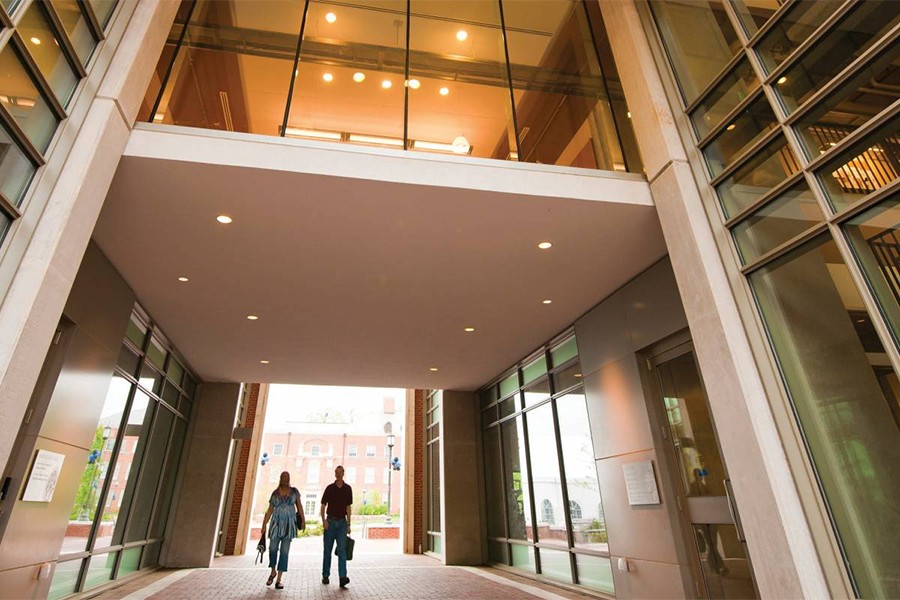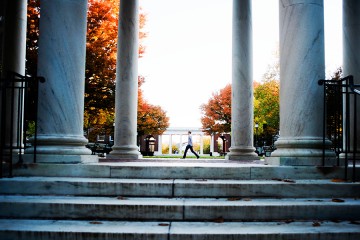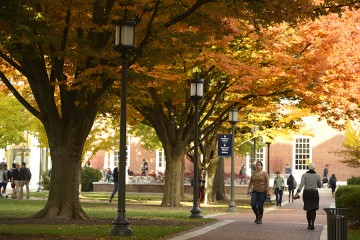Johns Hopkins University graduate programs in nursing, education, medicine, and biomedical engineering are again considered among the best in the country, according to the newest U.S. News & World Report rankings of "Best Graduate Schools" for 2018.
Released on Tuesday, the list puts JHU's biomedical engineering program—run jointly by the Whiting School of Engineering and the School of Medicine—in the No. 1 spot it has long held, though it shares the top honor this year with the Massachusetts Institute of Technology.
"What makes our program in biomedical engineering unique—and one of its greatest strengths—is that it resides equally in the School of Engineering and the School of Medicine," said Ed Schlesinger, dean of the Whiting School. "Our graduate students are mentored by clinicians at one of the world's top hospitals, where they make a positive impact on society by conducting and translating research into technologies that solve major health challenges."
In overall graduate ranking, the Whiting School moved up two spots since last year into a tie for 19th with Northwestern University.
The School of Medicine remains third for research-focused medical schools, although no longer in a three-way tie. Two programs at Medicine—geriatrics and drug and alcohol abuse—were ranked first.
The Johns Hopkins School of Nursing slips one notch, from No. 1 to No. 2, behind Duke University, though the school does hold top positions in several specialties. For the second straight year the program was ranked first for administration; and the nurse practitioner program jumped to first from second place for adult, gerontology acute care and to first from fourth in family care.
"We are proud to be consistently ranked as one of the top three schools of nursing across the nation and world," said Patricia Davidson, dean of the School of Nursing. "It speaks volumes to our leadership and innovation that remain at the core of our mission to serve local and global communities. Our research and funding have remained strong, and we're excited for many program developments on the horizon."
Johns Hopkins finished in the top five in five of eight nursing specialty categories. Along with the first-place ranks, the nurse practitioner program was ranked second in adult gerontology primary care, fourth in pediatric primary care, and fifth in the category of psychiatric/mental health across the lifespan.
The master's and doctoral programs at the university's Bloomberg School of Public Health remain No. 1, though public health programs are not newly ranked this year (the most recent rankings were released in 2015). BSPH has held the No. 1 spot every year since U.S. News began ranking schools of public health more than 20 years ago.
The School of Education slipped to sixth from a tie for second last year, and a first-place rank in 2014 and 2015.
The School of Medicine finished third behind Harvard and Stanford universities among medical schools emphasizing research, but now holds that position alone. Last year, the school finished third in a three-way tie with the University of Pennsylvania and UC San Francisco. The Johns Hopkins School of Medicine has tied for third place or has held that spot alone since 2013. The school's geriatrics program has held the top spot three years running now, after placing second in 2014.
Johns Hopkins was among the top four in five of the seven medicine subcategories—second in internal medicine, fourth in pediatrics, and fourth in women's health, in addition to its No. 1 rankings in geriatrics and drug and alcohol abuse.
"We are again honored to be recognized for our leadership in training the next generation of physicians and scientists who will make the health and lives of older adults better," said Samuel Durso, director of the Division of Geriatric Medicine and Gerontology. "In addition to our institutional role, this honor also reflects the enormous influence our faculty and fellows contributes to health policy and practices nationally."
Editor's note: The No. 1 ranking for the drug and alcohol abuse program at the School of Medicine was omitted in an earlier version of this article. The Hub regrets the error.
Posted in University News










